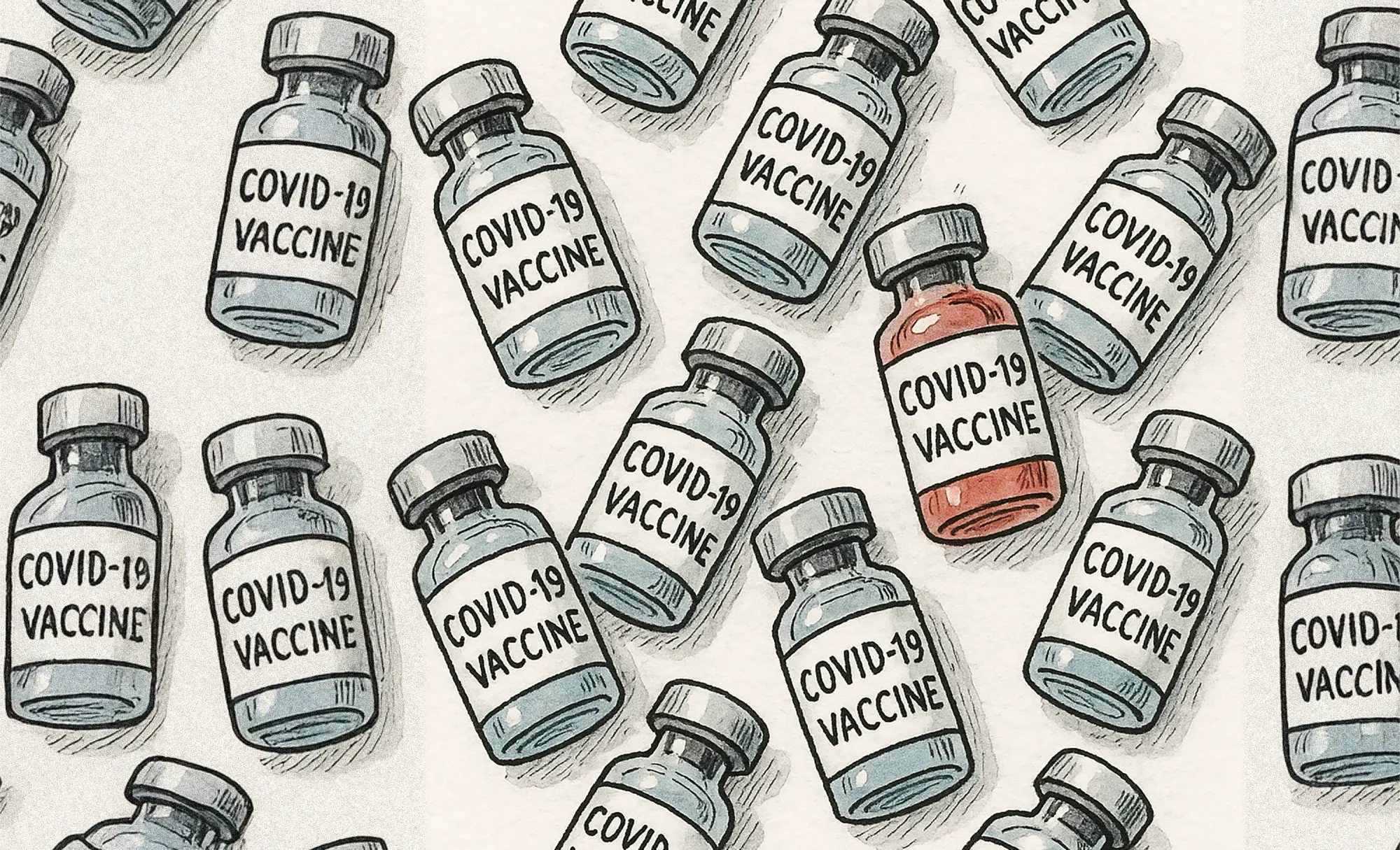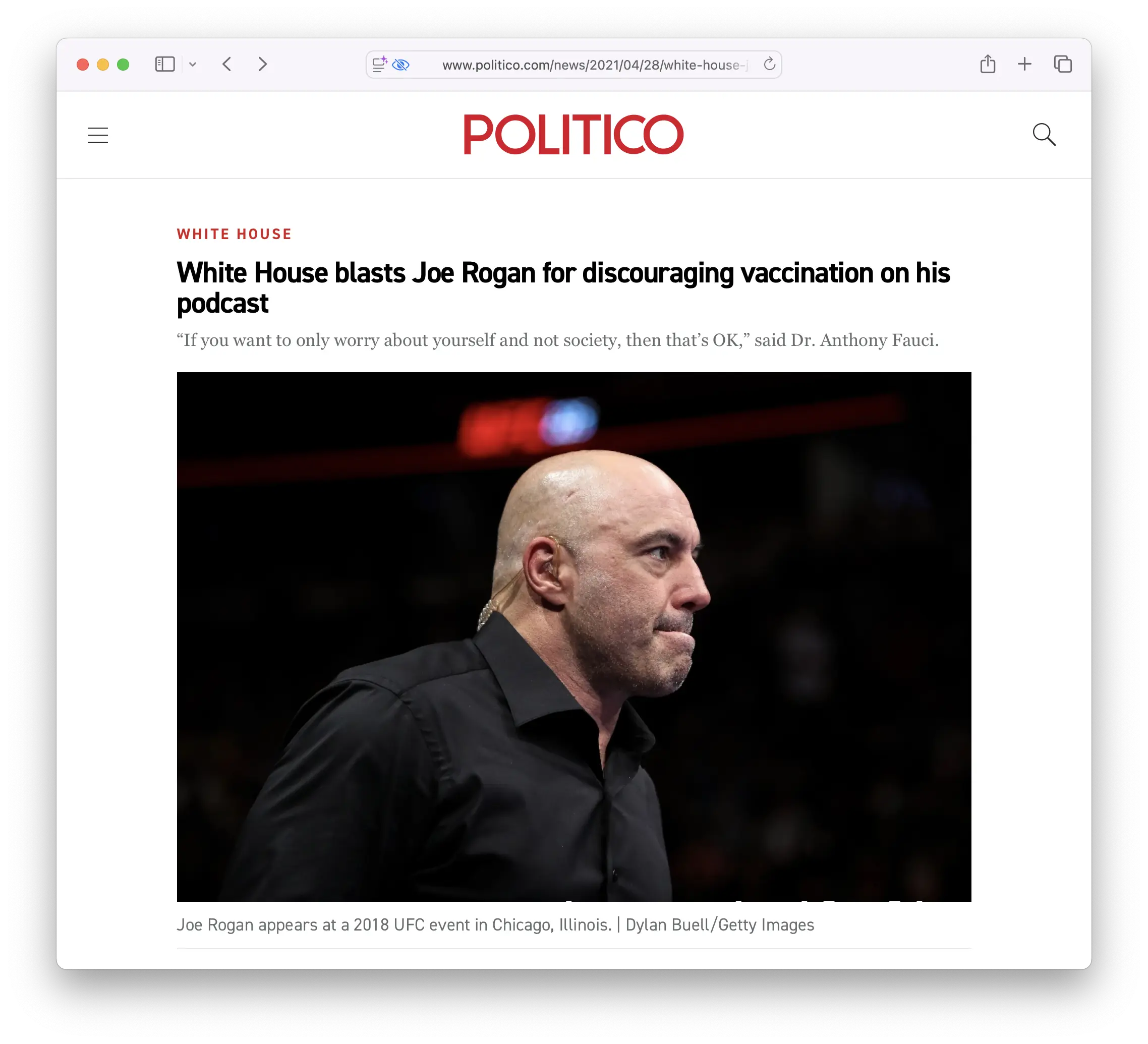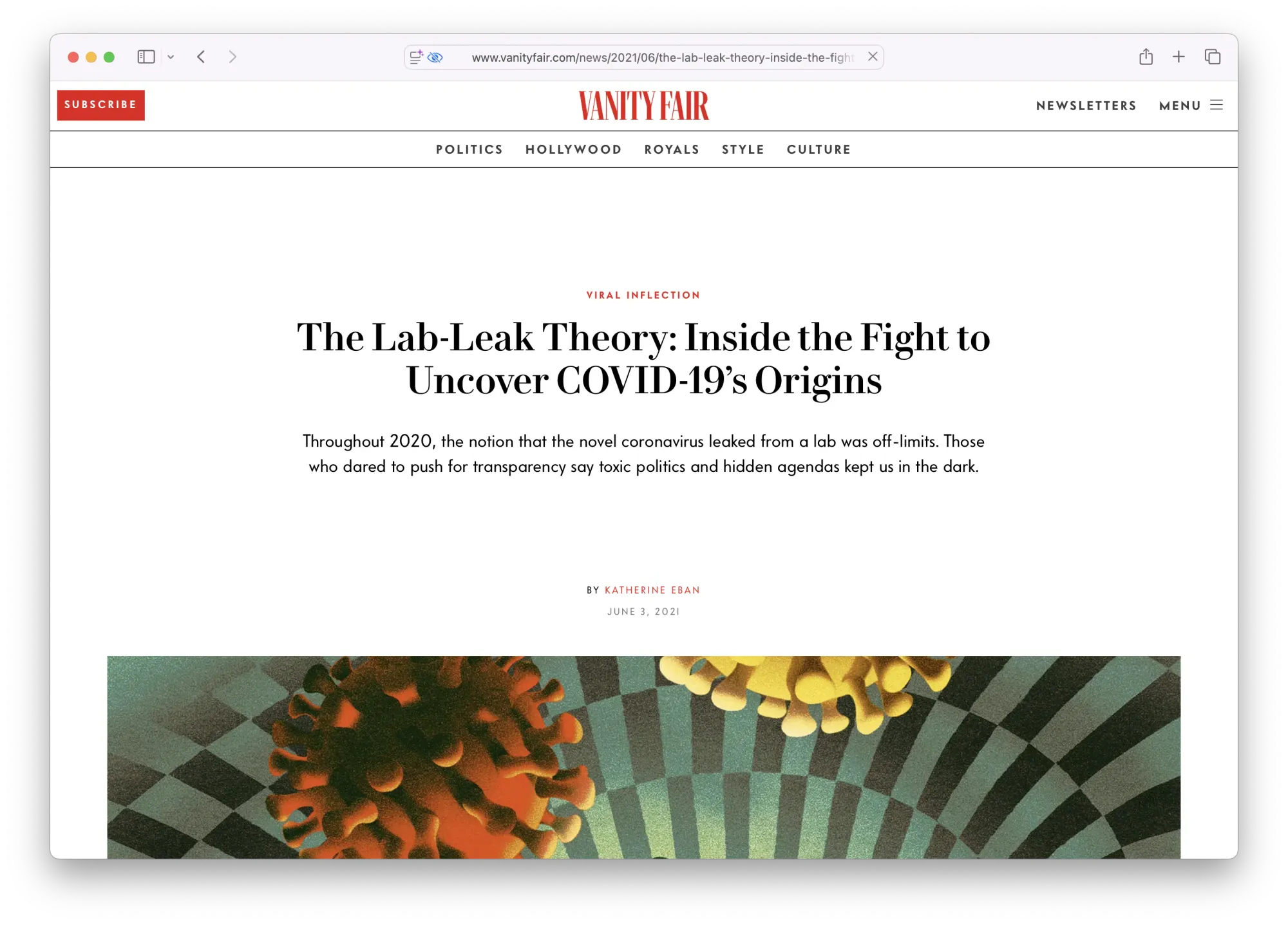Why Do So Many People Distrust the COVID Vaccine?

The intense debate surrounding the COVID-19 vaccine shed light on a remarkable level of distrust in public health and scientific authorities. According to a report1 from the Annenberg Public Policy Center, 22–28 percent of people believed that the COVID vaccine was responsible for “thousands” of deaths, even though the CDC states2 that the vaccine is protective from COVID deaths while simultaneously not increasing the risk of death from non-COVID causes. Vaccine hesitancy was even present among many healthcare workers. In a survey3 of 78,000 healthcare personnel, 17 percent of respondents reported being hesitant or unsure of the COVID vaccine. Moreover, there is a troubling political divide on vaccine attitudes. One study4 found that Trump voters were about five times more likely to be skeptical of the vaccine than Biden voters.
Many members of the elite class have responded to the vaccine hesitancy with an unfortunate degree of disdain. One L.A. Times article5 is entitled “Mocking anti-vaxxers’ COVID deaths is ghoulish, yes—but may be necessary” [my emphasis]. An academic article6 published in a leading medical journal referred to antivaccine attitudes as “deliberate ignorance.” In a heated exchange on CNN, anchor Chris Cuomo told a caller he “sound[ed] like an idiot.” Famous podcaster Joe Rogan, who has received, by far, more follows on Spotify7 than any other show (in fact, more than the second, third, and fourth ranked shows combined) has been famously skeptical of the COVID narrative. Many have responded with condescension; in a CNN interview, the White House Communications director asked, mockingly, “Did Joe Rogan become a medical doctor while we weren’t looking?”8

The proportion of people who report “not too much” or “no confidence at all” in medical scientists doubled between April 2020 and december 2021.
The point of this essay is not to debate the merits of the COVID vaccine. Instead, I address several arguably more fundamental questions: Has trust in authority actually been on the decline? If so, why? And what are the consequences with respect to the COVID vaccine debate?
We now trust authorities less than we used to.
The evidence is clear that trust in authorities has decreased sharply over the last several years. The proportion of people who report “not too much” or “no confidence at all” in medical scientists doubled9 between April 2020 (the start of the pandemic) and December 2021. Similarly, the percentage of U.S. adults who reported a lot of trust in physicians and hospitals decreased10 from approximately 71 percent to an astounding 40 percent between April 2020 and January 2024. The increased skepticism is not limited to individuals; distrust of the Centers for Disease Control (CDC) tripled11 from April 2020 to January 2022.
What explains this notable rise in medical distrust since COVID? Although cause and effect cannot be clearly established, the answer may stem from a string of several unfortunate (at best) misrepresentations or (at worst) outright lies.
- As summarized by the Heritage Institute12 (in an admittedly exaggerated title), scientists, government officials, and public health organizations were, in 2020, highly dismissive of the possibility that the COVID outbreak was due to a lab leak. It is certainly true that we did not have sufficient information at that time to conclude it was a lab leak, but any alternative explanation would have to contend with the incredible coincidence that COVID emerged in the same city that was home to the Wuhan Institute of Virology. The Wuhan institute was one of only a very small number of labs in the world—perhaps as few as three13—conducting gain-of-function research on the Coronavirus. Lab spillovers are far from unprecedented.14
- In testimony15 from June 2024 that Anthony Fauci gave to a congressional subcommittee, several disturbing facts emerged, including prior misrepresentations about conflicts of interest and the scientific basis underpinning the six-foot social distancing guidance.
- CDC director Dr. Rochelle Walensky told Rachel Maddow that “vaccinated people do not carry the virus, can’t get sick.”16 This even conflicted with the information given on the CDC’s own website.
- More than 1200 public health professionals signed a letter17 in support of the summer 2020 protests, noting, in part “[W]e do not condemn these gatherings as risky for COVID-19 transmission. We support them as vital to the national public health and to the threatened health specifically of Black people.” As readers will remember, these protests were mass gatherings of tens of thousands of demonstrators marching shoulder to shoulder. Meanwhile, as part of the lockdowns—in effect at that time—many jurisdictions also had regulations against social gatherings that conflicted with the signed public letter.

Trust is difficult to establish and easy to lose.
I don’t discuss these issues in the spirit of relitigating old grievances; in fact, there are plenty others I don’t mention. My point is that we must consider the cultural context that corresponded to the aforementioned decreased trust in authority. Should we truly be surprised that the public became distrustful against this backdrop? My critics might argue that it is still illogical to distrust authorities due to a small number of times that they led us astray. Such critics might go on to point out the numerous benefits—from penicillin to germ theory to stunningly effective antiretroviral therapy for HIV—that have stemmed from the hard work of experts. Surely, they might say, it is, in totality, better to trust authority figures.
I am sympathetic with this argument. Considered narrowly, it is almost surely correct. If medical and public health experts were never trusted, we would be far worse off. However, I also believe it misses the point. First, it sets up a false dichotomy between trusting all experts and trusting no experts. More to the point, however, it fails to account for the inherent fragility of trust, a fragility that, rightly or wrongly, is simply human nature. From an evolutionary standpoint, trust may be difficult due to something called the adaptive bias, which refers to the tendency for individuals to minimize the cost of errors rather than the number of errors. Our ancestors may have faced greater threats to survival when they trusted others they shouldn’t have versus when they failed to trust others they should have. If true, then it’s possible that our difficulty in trusting others is an evolved adaptation.
Trust is easier to destroy than it is to build [and] trust rebuilding may take even longer than it took to create the original level of trust.
As we can all understand from our personal lives, it doesn’t take much to make us distrustful. Someone may have a close friend for decades with a near perfect record of being honest even in difficult situations. But if that friend deceives us even once—for example by canceling plans after saying they’re sick, but then posts an Instagram story showing they went out with other friends—the relationship is liable to suffer. Psychological research18 also shows how perceived betrayal can cause significant relationship damage even among pairs of people who don’t know each other in a laboratory trust game.19 Moreover, when people encounter violations of trust from one entity, there is a spillover effect such that they become less trustful of other similar groups. This implies that a general distrust of authorities could result from trust violations from just a handful of authority figures. Once trust is broken, it is difficult to repair. As Roy Lewicki, a leading scholar in the study of trust development and trust repair, writes, “[T]rust is easier to destroy than it is to build [and] trust rebuilding may take even longer than it took to create the original level of trust.”20
The Consequences of Losing Trust
Trust in authority has been on the decline, and this should not surprise us given several high-profile misrepresentations or deceits. What happens when people lose trust in authority figures for topics such as vaccines? My contention is that they still seek out information, but will do so with all the biases that are inherent to human beings. One such example is the availability bias, where people inflate the likelihood of events that easily come to mind. After the COVID vaccine became widely adopted, there were a handful of reports of people who experienced severe negative reactions. One notable example is the blood clots suffered by NBA player Brandon Goodwin. There does indeed seem to be a link between blood clots and the vaccine, but it is extraordinarily rare.21 Nonetheless, just as people are liable to vastly overestimate the probability they will die in a plane crash due to the occasional news report about plane crashes, we should also expect that the perception of serious adverse events will be impacted by well-publicized stories of famous individuals who fall ill after receiving a vaccine, especially athletes, as they are assumed to be in top physical condition.

It is also worth pointing out the important distinction between a bad medical outcome occurring after the vaccine, and the outcome being caused by the vaccine. People are prone to conflating the two, another cognitive bias called the illusory causation bias (which can also be thought of as the logical fallacy of Post Hoc Ergo Propter Hoc—“after this, therefore because of this”). The tragic case of Goodwin is a good example. He understandably attributed the blood clots to the vaccine, stating “The vaccine ended my season … One thousand percent.”22 If I were also a professional athlete with no health problems who developed a serious issue after getting the vaccine, I would likely feel the same way. However, with millions of people getting jabbed, there will always be some serious medical problems experienced by some individuals after the vaccine. At times it may be causal, but many times it will probably be coincidental. Only randomized trials comparing adverse events among people randomized to receive the real vaccine or a placebo vaccine can answer this question. Sadly, this is where scientific experts are needed: to explain to the public the nuanced distinction between correlation and causation. If experts are not trusted, individuals will draw their own conclusions from whatever information is available to them, or even the information they selectively seek out.
The politicized nature of the vaccine also bears relevance. As noted above, there was a sharp distinction in vaccine attitudes between Democrats and Republicans. This may operate on what Keith Stanovich has termed myside bias (a close cousin of confirmation bias), which he defines as “the bias that occurs when we evaluate evidence, generate evidence, and test hypotheses in a manner favorable toward our prior opinions and attitudes—where the attitudes in question are convictions.” The disturbing political polarization we face essentially places many people into different teams. If Team Red is antivaccine then members of Team Red will be prone to interpret provaccine information with caution and antivaccine information with acceptance. (I should note that the myside bias is not unique to Republicans. Peter Ditto and colleagues have shown that it has roughly equal23 occurrence among members of each of the two parties).
Additionally, there is likely an important role of the nocebo effect in understanding vaccine hesitancy. This is a topic Grayson Baird and I have previously covered in Skeptic.24 The nocebo effect is essentially the opposite of the placebo effect. Nocebo refers to experiencing negative symptoms as a result of expecting them. As Kate MacKrill discusses in The Nocebo Effect: When Words Make You Sick, reports of side effects from the COVID vaccine increased right after media coverage of those side effects—a possible (though not certain) nocebo effect. It is also noteworthy that the symptoms of myocarditis, one of the most serious vaccine side effects, include breathing problems and chest pain. In some cases, these could be misattributions from experiencing extreme anxiety about the vaccine. The point is that if people expect to feel ill after getting the vaccine they are more likely to actually experience symptoms. And social media can greatly amplify that effect. If discussions of vaccine side effects spread through certain echo chambers, it could even spark a certain type of mass contagion.
The distrustful are not dumb, or at least they are no dumber than the rest of us.
Sadly, cognitive biases and the nocebo effect set up a perfect breeding ground for distrust in the vaccine. And even if the COVID vaccine is generally effective, there were potentially misleading reports25 exaggerating its effectiveness, including among children.26 This may have sparked even further confusion.
How to Rebuild Trust
The distrustful are not dumb, or at least they are no dumber than the rest of us. One surprising finding from the psychological literature is that intelligence seems uncorrelated27 with the types of biases described above. In fact, some research28 suggests that highly intelligent people are more prone to bias.
As a society, we need authority figures who act in a manner that inspires trust, and a population that trusts them. However, the latter is contingent on the former. Rebuilding trust requires that such authorities act with unimpeachable integrity—centering on truth and honesty, even (or especially) when doing so is difficult. It also requires an acceptance that trust will take time to rebuild, and those who are distrustful should be heard, not ridiculed. If done well, there’s at least a chance the public can slowly grow to trust authorities again, and we hope that when the next inevitable disaster strikes we can avoid descending into collective madness.